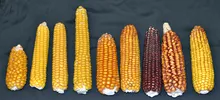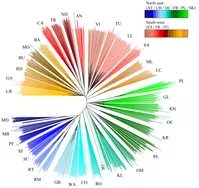Maize
MAZE - Accessing the genomic and functional diversity of maize to improve quantitative traits
Fabio Guffanti, Sebastian Urzinger, Yan-Cheng Lin, Clara Polzer, Michelle Teran, Chris-Carolin Schön
Project coordination: Ulrike Utans-Schneitz
Project duration: 1.10.2016 - 31.01.2020 (phase 1), 1.02.2020 - 31.01.2023 (phase 2), 1.02.2023 - 31.01.2026 (phase 3)
Project partners:
Frank Hochholdinger, Rheinische Friedrich-Wilhelms-Universität Bonn
Klaus Mayer, Georg Haberer, Manuel Spannagl, Helmholtz Zentrum München
Kerstin Nagel, Forschungszentrum Jülich
Andreas Weber, Peter Westhoff, Heinrich-Heine-Universität Düsseldorf
Markus Stetter, Universität zu Köln
Sebastian Schultheiss, Computomics GmbH
Milena Ouzunova, KWS SAAT SE & Co.KGaA
Project management agency: Project Management Jülich (PTJ)
Funding: Federal Ministry of Education and Research (BMBF)
Project description (phase 3):
Genetic improvement is essential to secure sustainable crop production. The project MAZE develops solutions to access native diversity in a targeted way with the goal to improve quantitative traits relevant for crop production. Resolving structure-function relationships at the nucleotide and amino acid level is a key step in a biology-inspired breeding strategy. Building on the achievements of previous project phases, we aim to molecularly characterize genomic regions with a large effect on early development, root and drought-related traits. The goal is to understand the function of candidate genes in these regions and to search for additional alleles in the available maize gene pool. We developed an efficient pipeline for candidate gene discovery and validation through forward and reverse genetic approaches and will now fine-map several marker-trait associations down to few candidate genes. For European flint material, the MAZE analysis pipeline will be extended with a transcriptome atlas to advance the predictive functional analysis of the flint gene and intergenic space at a pan-genomic and targeted local level. Broadening the genetic base of elite germplasm for quantitative traits requires recurrent population improvement. Genome-based methods open new avenues for decreasing cycle length and upscaling the number of selection candidates. During the course of the MAZE project, a genome-based rapid cycling experiment was initiated. The resulting experimental data will provide a comprehensive assessment of the potential of rapid cycling selection in landraces. It will allow to establish a framework for cost-benefit analyses of pre-breeding schemes. We aim to understand the factors that determine selection gain during pre-breeding by dissecting the factors that influence allele frequency shifts along the genome. Based on these results we will optimize and accelerate the bridging process that guides integration of landrace-derived material into elite germplasm.
More information: www.europeanmaize.net




